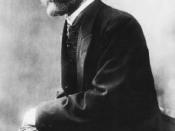The phenomenon of crime has been a constant element of human society. Criminology emerged as a field of study through the 18th and 19th centuries, concerned with the nature, extent, cause and control of criminal behavior and relating it to the world of information, beliefs and attitudes present in any particular place at any particular time. Within the diverse and competing perspectives of criminology, social explanations of crime perceive crime as a manifestation of social pathology generated as a product of social structure itself; as opposed to explanations of individual pathology concerning psychological and biological traits. Social explanations of crime further diverge into the two distinct schools of consensus and conflict theories. Functionalist or consensus theory share a common structural explanation of causes of deviance; while interactionist or conflict theory primarily focuses on various elements of power-play, regarding deviance as an outcome of the labeling interaction process between people. This essay focuses on the consensus school of thought, looking in particular at Mertons' Strain Theory; and Durkheims' anomie theory.
In order to understand the concept of Strain Theory, it is essential to begin with its fundamental basis pioneered by the French sociologist Emile Durkheim (1858-1917.) Rejecting the idea that crime can be solely explained by biology or psychology of individuals, Durkheim presented the notion that crime is essentially a social phenomenon, 'somehow being related to and shaped by wider social processes and structures.' Therefore the construct of a `criminal' or `deviant' becomes a product of a specific kind of social order. The offender is seen to have few conscious choices regarding their available social options as their activities and values are seen to be determined by wider societal forces and factors.
Further, Durkheim introduced the idea of each society being characterised by a specific form of 'collective conscience.'...


